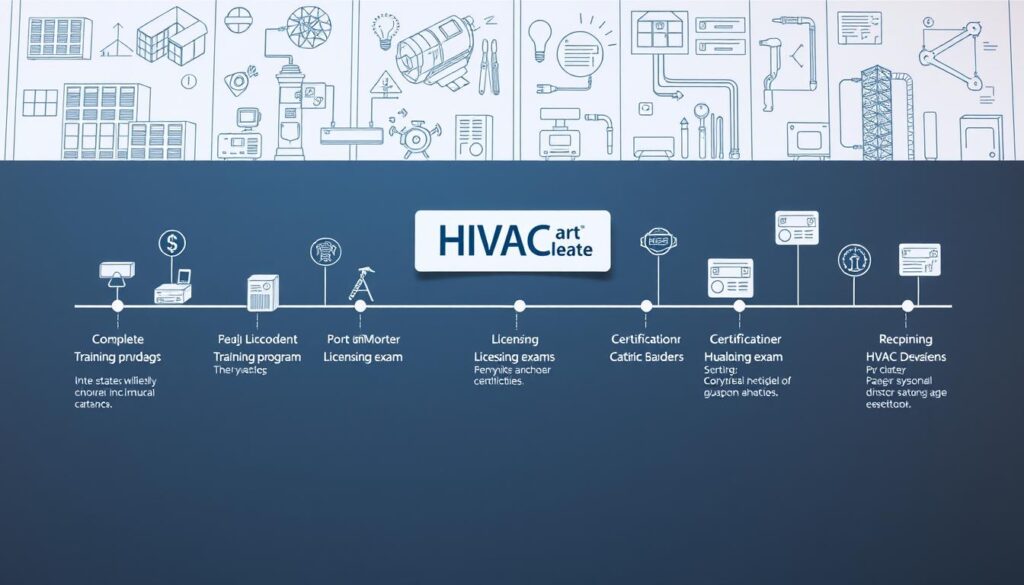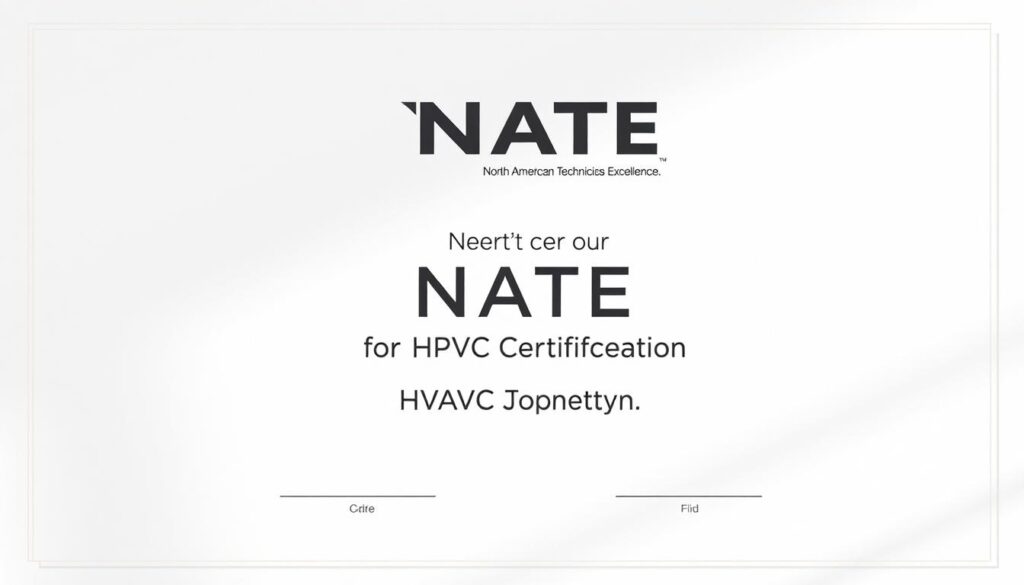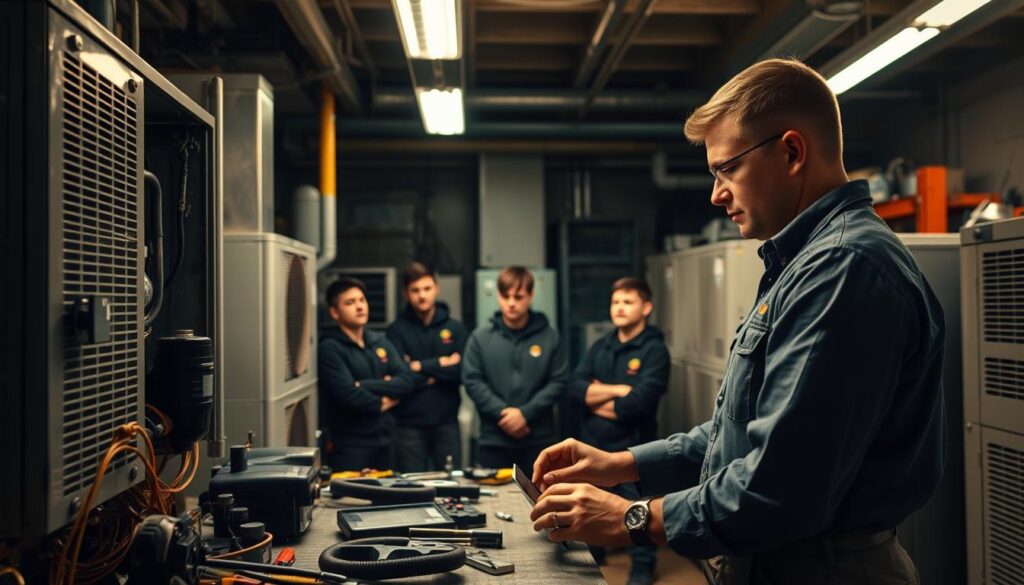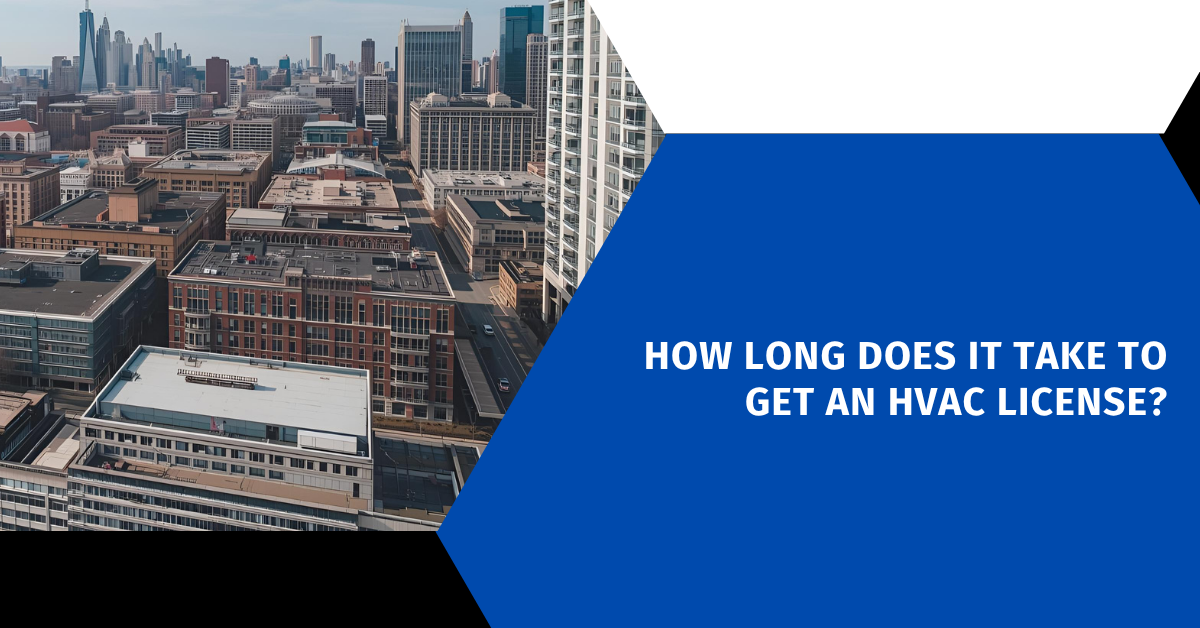Affiliate Disclosure
HVAC Guide Guys is a participant in the Amazon Services LLC Associates Program, an affiliate advertising program designed to provide a means for sites to earn advertising fees by advertising and linking to Amazon.
How Long Does It Take to Get an HVAC License? Are you curious about how long it takes to become a certified HVAC technician? The journey to get an HVAC license might seem long and complicated. But knowing the timeline can help you plan your career better.

Getting an HVAC certification shows you’re a pro in the field and serious about your work. The time it takes to get a license varies. It depends on your education, training, and what your state requires.
Usually, it takes 2-5 years to become an HVAC technician. This includes finishing school, getting practical experience, and meeting certification standards. These standards check if you know your stuff about heating, ventilation, and air conditioning systems.
Key Takeaways
- HVAC licensing timelines range from 2-5 years
- Educational programs are key for certification
- State rules greatly affect the licensing process
- Practical training is vital for becoming certified
- Keep learning to move up in your career
Table of Contents
Understanding HVAC Certification and Licensing
Getting into HVAC licensing can seem tough, but it’s key for your career. To become a licensed HVAC tech, you need to pass through many steps. These steps change from state to state.
There are many HVAC license needs. You’ll need to get several certifications to show you know your stuff. These certifications make sure you meet industry standards and can work legally.
Types of HVAC Certifications
Getting the right HVAC certifications is vital for your career. You’ll need to get a few important ones. These include:
- EPA 608 Certification
- NATE (North American Technician Excellence) Certification
- Manufacturer-specific credentials
- State-level professional licenses
State-Specific Requirements
Each state has its own HVAC licensing rules. Some states ask for lots of paperwork, tests, and background checks. Make sure to check your state’s rules to follow them.
Federal Regulations
Federal rules are also important for HVAC certifications. The Environmental Protection Agency (EPA) has strict rules for handling refrigerants and keeping the environment safe. Technicians must follow these rules to work in the HVAC field legally.
Professional tip: Always check with your state’s licensing board for the latest on certifications. Keep up with any changes in rules.
Explore Our HVAC Shop
Looking for top-rated HVAC tools, parts, and accessories? Visit our shop and find the perfect solution for your needs.
Visit the ShopBasic Educational Requirements for HVAC Licensing
Starting a career as an HVAC technician requires understanding the basic education needed. You must first get a high school diploma or GED. This is the first step towards getting certified.
There are different paths to becoming an HVAC professional. Most programs have similar foundational elements. You’ll need to look at several educational options:
- High school diploma or equivalent
- Vocational training programs
- Technical school certifications
- Associate degree in HVAC technology
The time it takes to become an HVAC technician varies. It can be from 6 months to 2 years, depending on your choice. Vocational programs get you started quickly, while associate degrees offer more in-depth training. Your choice affects your future career and earnings.
Investing in your HVAC education is key to a successful technical career.
Community colleges and technical institutes offer HVAC programs. These programs mix classroom learning with hands-on training. They prepare you for certifications and give a strong base in:
- Electrical systems
- Refrigeration principles
- Heating and cooling technologies
- Safety protocols
When picking an HVAC program, look at accreditation, hands-on training, and local licensing requirements. A thorough education leads to a fulfilling technical career.
HVAC Training Program Options
Choosing the right training program is key to becoming a certified HVAC professional. Your education path greatly affects your career start time and job opportunities.
Exploring how to become certified in HVAC, you’ll find three main educational paths:
- Certificate Programs: Quick entry into the field
- Diploma Programs: Thorough foundational training
- Associate Degree Programs: Most detailed educational choice
Certificate Programs: Fast-Track Your HVAC Career
Certificate programs are the quickest way to start as an HVAC technician. They last 6-12 months. You’ll learn key technical skills, safety rules, and basic system upkeep.
Diploma Programs: Deeper Technical Understanding
Diploma programs dive deeper into HVAC systems. They last 9-15 months. You’ll get advanced technical knowledge and hands-on experience with different systems.
Associate Degree Programs: Thorough Professional Preparation
An associate degree is the most detailed path for HVAC careers. These 18-24 month programs mix theory with practical skills. Graduates often have better job chances and higher starting pay.
Selecting the right program depends on your career goals, time availability, and financial resources.
Explore Our HVAC Shop
Looking for top-rated HVAC tools, parts, and accessories? Visit our shop and find the perfect solution for your needs.
Visit the ShopHow Long Does It Take to Get an HVAC License?
Getting an HVAC license is a complex process with several steps. The time it takes can range from 1 to 5 years. This depends on your path and the state’s rules.
There are a few main stages to becoming a licensed HVAC pro:
- Educational training (6-24 months)
- Apprenticeship program (2-4 years)
- Certification exams
- State licensing requirements
The time it takes to get licensed varies a lot. Full-time students might finish quicker. But, working people might take longer because of their jobs.
There are different ways to get licensed:
- Trade school certificate (6-12 months)
- Community college associate degree (18-24 months)
- Apprenticeship programs (3-5 years)
State rules are key in determining licensing time. Some states need a lot of practical experience. Others have quicker processes. Always check your local licensing board for exact rules and waiting times.
Pro Tip: Start collecting documentation and work experience early to expedite your licensing journey.
EPA Section 608 Certification Process
Understanding the EPA Section 608 Certification is key for HVAC technicians. It shows they can work with refrigerants safely and well.
The EPA Section 608 Certification is vital for those in refrigeration and air conditioning. It’s part of your HVAC certification journey. It proves you know how to handle refrigerants right.
Different EPA Certification Levels
The certification has four levels, each for different systems:
- Type I: Small appliances (window units, residential refrigerators)
- Type II: High-pressure and medium-pressure appliances
- Type III: Low-pressure appliances
- Universal: Covers all types of refrigeration systems
Exam Requirements and Timeline
Here’s what you need for EPA Section 608 certification:
- Finish a training course or study on your own
- Pass the certification exam
- Get your EPA certification
The whole process usually takes 2-4 weeks. It depends on how ready you are and when you can take the exam.
Certification Renewal Process
The EPA Section 608 Certification doesn’t expire. But, it’s important to keep up with new industry standards and tech.
It’s good to update your skills and knowledge often. This keeps you competitive in HVAC.
Explore Our HVAC Shop
Looking for top-rated HVAC tools, parts, and accessories? Visit our shop and find the perfect solution for your needs.
Visit the ShopNATE Certification Requirements and Timeline

Getting certified as an HVAC professional is a big step in your career. North American Technician Excellence (NATE) certification is key. It shows you have the skills and knowledge needed in the HVAC field.
NATE has different paths for HVAC technicians. To begin, you need to:
- Select a specific HVAC specialty area
- Meet prerequisite work experience requirements
- Prepare for in-depth knowledge exams
- Pass both core and specialty tests
Getting NATE certified can take 6 to 18 months. It depends on your experience and how much you study. You’ll need to show your skills through tough exams that test your technical knowledge.
There are various levels of certification:
- Entry-level certifications
- Professional-level credentials
- Senior-level specializations
Studying for these exams will test your knowledge. You’ll learn about system design, installation, maintenance, and troubleshooting.
Getting NATE certified boosts your professional standing and job chances in HVAC.
Apprenticeship Programs and Duration
HVAC apprenticeships are a great way to become a skilled technician. They mix classroom learning with hands-on practice. This gives you a strong base in the HVAC field. Knowing how long an HVAC apprenticeship lasts is key for those thinking about this career.
HVAC apprenticeships usually last 3-5 years. This depends on where you are and what you need. You’ll learn a lot of skills through both classes and real-world training.
Structured Learning Components
Your apprenticeship will cover important topics for an HVAC career:
- Technical classroom instruction
- Safety training protocols
- Advanced equipment operation
- System design and maintenance principles
On-the-Job Training Requirements
Practical training is at the heart of HVAC apprenticeships. You’ll work with experts to learn real skills:
- Supervised installation practices
- Diagnostic techniques
- Repair and maintenance procedures
- Customer service interactions
Completion Timeframes
Your apprenticeship time can change based on a few things:
- Local licensing requirements
- Program complexity
- Individual learning pace
- Specialization areas
Choosing a detailed apprenticeship program helps you grow in the HVAC field. It sets you up for a fulfilling career.
State Licensing Process and Waiting Periods
Getting an HVAC license can be tricky and changes a lot from state to state. Each place has its own rules for HVAC techs. It’s very important to know what your state needs.
The time it takes to get a license is usually between 4 to 12 weeks. This depends on your state’s rules. Some things that can slow down the process include:
- Educational background verification
- Work experience documentation
- Exam scheduling and results
- Background check processing
Different states have different rules for licenses. For example:
| State | Processing Time | Key Requirements |
|---|---|---|
| California | 8-10 weeks | Trade exam, work experience |
| Texas | 6-8 weeks | Journeyman certification |
| Florida | 4-6 weeks | State-specific exam |
To make the licensing process easier, you should:
- Research your state’s specific requirements
- Gather all necessary documentation
- Complete required educational programs
- Schedule and pass state licensing exams
- Submit a complete application
Pro tip: Contact your state’s licensing board directly to get the most up-to-date information on current processing times and specific requirements.
Explore Our HVAC Shop
Looking for top-rated HVAC tools, parts, and accessories? Visit our shop and find the perfect solution for your needs.
Visit the ShopCareer Advancement Opportunities and Timelines
Your HVAC career has many paths for growth. Knowing the hvac contractor license timeframe helps plan your career. The HVAC industry has different certifications for specialized skills and higher pay.

- Apprentice Certificate: Entry-level with supervised training
- Journeyman Certificate: Mid-level with more responsibilities
- Master Certificate: Top level with deep expertise
Journey Level Certification
To get journey level certification, you need about 4-5 years of experience. This includes 2,000 hours of training each year and passing tough exams. The journey to this level requires hard work and constant skill improvement.
Master Level Requirements
Master level certification is the highest achievement in HVAC. To reach it, you must:
- Have at least 8 years of verified experience
- Have advanced technical knowledge
- Pass tough state exams
Contractor Licensing Options
To be an independent HVAC contractor, you need more than just certifications. Most states require at least 10 years of experience, a business management exam, and insurance. The time needed for your hvac contractor license varies by state and your progress.
Manufacturer-Specific Certifications
Manufacturer-specific certifications are key in your HVAC journey. They show you know specific brands well. This boosts your career chances.
Big HVAC brands have their own certification programs. These programs check your skills with their gear. You’ll learn through:
- Manufacturer-sponsored training courses
- Comprehensive equipment knowledge tests
- Hands-on technical skill assessments
- Specialized equipment maintenance training
Brands like Carrier, Trane, and Lennox have tough certification paths. These can take from 1-3 days for basic ones to weeks for advanced ones.
Getting these certifications can speed up your HVAC career. They prove you’re skilled and:
- Make you more employable
- Show you’re tech-savvy
- Give you an edge in the job hunt
- Can even up your salary
Those who get certified are more ready for HVAC jobs. They’re better at setting up and fixing complex systems.
Explore Our HVAC Shop
Looking for top-rated HVAC tools, parts, and accessories? Visit our shop and find the perfect solution for your needs.
Visit the ShopProfessional Development and Continuing Education
Being an HVAC pro doesn’t stop after you get your first license. You need to keep learning to stay sharp and keep up with the industry. This is key to growing in your career.
Most states make you keep learning to keep your license. This keeps you current with new tech and rules.
- Typical continuing education requirements range from 4-16 hours annually
- Courses cover emerging technologies, energy efficiency, and safety protocols
- Training can be completed through online platforms, workshops, and technical seminars
Getting certified is just the start. Continuous learning is key to career growth and maintaining your professional credentials.
| Education Type | Average Hours | Typical Cost |
|---|---|---|
| Online Courses | 6-8 hours | $50-$200 |
| Technical Workshops | 4-12 hours | $100-$500 |
| Industry Conferences | 8-16 hours | $250-$1000 |
Getting certified by groups like NATE and HVAC Excellence can boost your skills. It can also open up more career paths for you.
Conclusion
Getting an HVAC license takes dedication and planning. The time it takes depends on your education, state rules, and how fast you learn. It usually takes from 6 months to 4 years, with different certifications to choose from.
The HVAC industry is growing fast, with 40,100 new jobs expected by 2033. This growth shows why getting licensed and trained is key. Learning technical skills and meeting state rules will help you succeed.
Your path to getting an HVAC license is your own. While there are general timelines, your personal situation and local laws matter too. By studying your state’s rules, finishing training, and keeping up with new skills, you’ll boost your career.
Starting a career in HVAC can be very rewarding. Knowing the licensing process and growing professionally will prepare you for the industry’s needs. You’ll play a vital role in this important field.

